Lexi Revellian's Blog, page 17
March 25, 2012
Puzzled ruminations on book covers...

I recently read Nick Hornby's novel , Juliet, Naked . I like Nick Hornby's writing - About A Boy is one of my favourite novels - and I enjoyed it very much, apart from finding the ending a little unsatisfactory (the offspring agreed). It's consistently amusing and thought-provoking. But one thing I really hated about it was the cover. I'm not even sure which character the man on it is supposed to be. I know authors are given little or no say in the covers that are assigned to their books, but you'd think an author of Hornby's stature would be able to put his foot down.
Researching this post, I looked at dozens of Nick Hornby's book covers, and began to think that he has been remarkably badly served by his publisher, Penguin. The classy and cool US Juliet, Naked hardback cover, seen here at the far right, is a rare exception.
Self-publishers know how important a cover is. Our names won't attract readers (initially at any rate) and we don't have the recognition factor of authors whose books are on display in book shops. A striking thumbnail image on Amazon might attract a reader to look at the blurb, and then the sample, and then maybe buy. All ambitious indies put a lot of work into designing or commissioning covers, changing them if we get a better idea. There are frequent threads on Kindleboards seeking reactions and comments on artwork before the author commits. We take the whole thing very seriously.
So are the bad covers another instance of the complacency of Big Publishing? Or have some commissioning editors just got seriously bad taste?
Published on March 25, 2012 06:07
March 17, 2012
Emails from readers
 One of the great perks of being (self) published is receiving emails from readers who have enjoyed my books and want to let me know. It's so kind of them to bother, and so encouraging to know they like my writing. I always answer - when the sender has typed his/her email address wrong and I can't it distresses me. (Trish who wrote today, I tried to reply but my email kept bouncing back - and I did start a sequel to Remix, but wrote Replica instead.)
One of the great perks of being (self) published is receiving emails from readers who have enjoyed my books and want to let me know. It's so kind of them to bother, and so encouraging to know they like my writing. I always answer - when the sender has typed his/her email address wrong and I can't it distresses me. (Trish who wrote today, I tried to reply but my email kept bouncing back - and I did start a sequel to Remix, but wrote Replica instead.)Way back in the early eighties I thought about writing an appreciative letter to Mary Renault, one of my favourite authors. I'd have had to send it via her publishers, I wasn't sure they'd forward it to South Africa where she lived, I didn't want to be a nuisance. I never wrote. Now I wish I had, as I know from my own experience it would have given her a cheering moment.
So here's to all readers out there who not only buy books, but write and thank their authors. Thank you.
Published on March 17, 2012 11:33
March 11, 2012
Things change - make the most of it
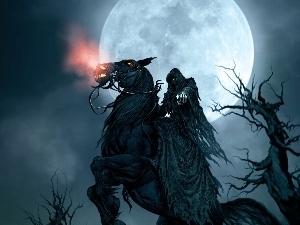 Yesterday I read Scott Turow's extraordinary rant about Amazon's evil empire, amusingly entitled Grim News.
Yesterday I read Scott Turow's extraordinary rant about Amazon's evil empire, amusingly entitled Grim News.Grim for publishers, bookshops and readers that is, though he tells us he personally, as an established author, will still manage okay. (Gosh, that's a relief.) I don't recognize the world he describes, where publishers and bookshops guard our cultural heritage and encourage readers to make discoveries of new authors and genres. I agree with Joe Konrath and David Gaughran - click on the links to read their opinions.
Scott Turow, as a successful author, did well out of the old system, so it's natural he should be resistant to change (though he should certainly be less resistant to logical thought). What I find odd is that many unpublished authors share his blinkered views, though there has never been a better time to be a writer than the present. Self-publishing has never been easier, and, short of marrying into the royal family, is the fastest way to a traditional publishing contract. I feel certain that once the publishing industry adapts, it and we will benefit. Everything is changing, and change means new opportunities.
It's not a sign of intelligence to keep doing the same thing and expect a different result. It's foolish to fight the current war with the weapons you used in the last. Let's all be grateful for our new options and make the most of them.
Published on March 11, 2012 11:40
March 3, 2012
KDP Select - my experience so far
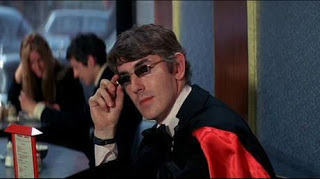 Peter Cook in 'Bedazzled', about to do a bit of devilish temptingI was an early adopter of KDP Select; my first 90 day contract ends 6th March 2012. Initially I was dubious as to how I would benefit, but trusted that Amazon would make it worth my while, and I sold so few copies via Smashwords I had little to lose.
Peter Cook in 'Bedazzled', about to do a bit of devilish temptingI was an early adopter of KDP Select; my first 90 day contract ends 6th March 2012. Initially I was dubious as to how I would benefit, but trusted that Amazon would make it worth my while, and I sold so few copies via Smashwords I had little to lose.Tentatively, at the end of January I tried a two day giveaway of Replica , at the same time raising the price to £1.99/$2.99, thus moving up to the 70% royalty from 35%. It did pretty well; from selling 395 copies in January, it sold 744 in February, plus 40 loans to Amazon Prime members at $1.60 each. So mid-February, I made Remix free for two days and increased the price. Remix sold 4,343 copies that month, plus 325 loans at $2.01. I have sold more books in other months, but I have never made so much money.
What KDP Select does is increase visibility and allow you to reach readers who might not otherwise come across your books. Amazon benefits from the upheavals in the charts, with a constant supply of new books showing up to tempt buyers.
Many see KDP Select as part of Amazon's evil scheme to gain world domination. Let me quote Robert Bidinotto on the subject:
Gosh, what a devious plot Amazon has going:
They keep throwing MONEY at us authors, and keep offering us NEW OPPORTUNITIES, always trying to make us HAPPY, so that we continue to deal with THEM rather than their competitors!
How can we POSSIBLY allow this ruthlessly manipulative scheme to continue??
Shouldn't we be giving Amazon's inferiors a fighting chance???
Nah. I shall be signing on for another 90 days.
Published on March 03, 2012 03:00
February 23, 2012
A list of successful self publishers with over 50,000 sales
This week, to my great delight, my total sales passed the 50,000 mark. Last night my ebook sales stood at 51,914, plus some paperbacks (the numbers are harder to keep track of, even though they are a lot smaller). There is a thread on Kindleboards, Authors who have sold more than 50,000 self-published ebooks to date , and I've reproduced the list below. Many have sold a LOT more - Chris Culver, for instance, sold 550,000 copies of The Abbey on his own. An asterisk indicates an author who was formerly traditionally published.
In circles hostile to indie authors, one often reads the assertion that although self-publishing has worked for people like Amanda Hocking and John Locke, the vast majority of us are lucky to sell 100 books. This necessarily incomplete list gives them the lie. And there are many more writers who, even though they haven't made this list yet, are earning respectable money from their writing and reaching readers.
INDIE AUTHORS WHO HAVE SOLD MORE THAN 50,000 EBOOKS
Susan Alison
Dani Amore
Bella Andre
J Carson Black
Catherine Bybee
Ruth Cardello
Darcie Chan
Mel Comley
Blake Crouch
Chris Culver
David Dalglish
Saffina Desforges
Mainak Dhar
Mark Edwards & Louis Voss
Ellen Fisher
Penelope Fletcher
Tina Folsom
Barbara Freethy
Debora Geary
Lee Goldberg
Michael Hicks
Amanda Hocking
Hugh Howey
Nancy C. Johnson
Ty Johnston
Selena Kitt
* J.A. Konrath
Eve Langlais
* Stephen Leather
Victorine Lieske
John Locke
Terri Giuliano Long
CJ Lyons
H.P. Mallory
KC May
Bob Mayer
Stephanie McAfee
Courtney Milan
Rick Murcer
Scott Nicholson
Anne Marie Novark
Shayne Parkinson
T.R. Ragan
Terri Reid
Adam Rendon
Lexi Revellian
Nick Russell
L.J. Sellers
Michael J Sullivan
Heather Killough-Walden
MichaelWallace
Kerry Wilkinson
Rachel Yu
Published on February 23, 2012 04:17
February 17, 2012
Kerning and other sources of irritation
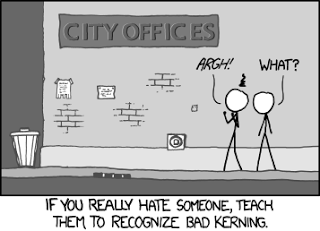 xkcd: A webcomic of romance, sarcasm, math and languageI'm sure all my blog readers know what kerning is - okay, one of you at the back there doesn't. Sit up straight and pay attention.
xkcd: A webcomic of romance, sarcasm, math and languageI'm sure all my blog readers know what kerning is - okay, one of you at the back there doesn't. Sit up straight and pay attention.Kerning is the adjustment of space between characters in a line of text, using their shape and relationship to each other to make them more visually appealing.
I use it when doing the lettering for my book covers; Adobe Photoshop allows you to fine tune spacing to a high degree. Once you become aware of the possibility of bad kerning, you will be irritated by it whenever you come across an example.
Another thing that once noticed, bugs you forever is incorrect apostrophes - unnecessary apostrophes are even worse than missing ones, as they demonstrate an inept striving for accuracy.
Getting more esoteric, indents should not be used at the start of chapters and after scene breaks. A traditional refinement subliminally indicating a break to the reader, this is the convention in printed books but many formatters of ebooks don't seem to know about it. I can't help noticing it as I read. I wish I didn't.
(What was that you just said? Pedantic, moi? Plih.)
Published on February 17, 2012 08:40
February 12, 2012
Song lyrics in novels - just don't go there
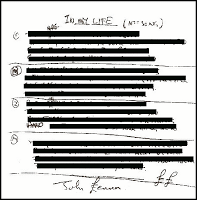 John Lennon's IN MY LIFE lyrics, redactedI can't remember where I first picked up the idea that it was very, very expensive to use snippets of song lyrics in the novel you are writing.
John Lennon's IN MY LIFE lyrics, redactedI can't remember where I first picked up the idea that it was very, very expensive to use snippets of song lyrics in the novel you are writing. I'd heard The Beatles never get quoted at all as the charges for so doing are astronomical.
So when I came to the scene in Remix where Caz is in her best friend James's car and she uneasily suspects he is romantically interested in her, then Some Enchanted Evening plays on the radio, I knew not to quote a few lines from the song though I would have liked to.
Not everyone does, though. This is Blake Morrison talking about his eleventh novel South of the River in the Guardian:
'I'd restricted myself to just a line or two from a handful of songs and vaguely hoped that was OK or that no one would notice. My editor, reasonably enough, was more cautious, and at the last minute someone from the publishing house helpfully secured the permissions on my behalf.
'I still have the invoices. For one line of "Jumpin' Jack Flash": £500. For one line of Oasis's "Wonderwall": £535. For one line of "When I'm Sixty-four": £735. For two lines of "I Shot the Sheriff" (words and music by Bob Marley, though in my head it was the Eric Clapton version): £1,000. Plus several more, of which only George Michael's "Fastlove" came in under £200. Plus VAT. Total cost: £4,401.75. A typical advance for a literary novel by a first-time author would barely meet the cost.'
Strewth. For those of you who didn't know this, now you do.
Published on February 12, 2012 10:34
February 7, 2012
Making indies less indie...
 Yesterday I read a curious piece in The Bookseller online about author and former literary agent Orna Ross's plans to set up a 'non-profit body representing the interests of self-published authors' called The Alliance of Independent Authors. Members will pay a fee to join.
Yesterday I read a curious piece in The Bookseller online about author and former literary agent Orna Ross's plans to set up a 'non-profit body representing the interests of self-published authors' called The Alliance of Independent Authors. Members will pay a fee to join.And how will writers benefit from tAoIA?
Orna Ross says: "We will be speaking up on behalf of independent authors, and making links with booksellers, wholesalers, agents and legacy publishers, so people have an idea of what our creative needs are. It requires a change of attitude both in writers and in other players. In the past, the author was a resource to be mined, but indie authorship is about meeting the publisher as a partner."
Right. I've always yearned for booksellers, wholesalers, agents and legacy publishers to be aware of my creative needs. Whatever they are. I wonder what they'll do once they've worked them out?
And "indie authorship is about meeting the publisher as a partner" - well, stone me, I'd always thought indie authorship was all about going it alone without a publisher. Shows how little I know.
At the moment, it's Them and Us. The publishing industry is unhappy about the hordes of self-publishers cluttering up territory that hitherto they have managed to keep fenced and gated. They are cross with Amazon for letting it happen. They look back nostalgically to the time when they had a monopoly of distribution and bricks and mortar bookshops were the only outlets; when self-publishing meant a garage full of books and nowhere to sell them; when an author they rejected stayed rejected. And we don't like them much either - why would we? Most of us have had experience of being ignored or treated with contempt by agents and publishers.
If Orna does somehow organize that meeting between unlikely partners, I'd love to be there and take notes.
Published on February 07, 2012 06:19
February 3, 2012
Amazon KDP angst
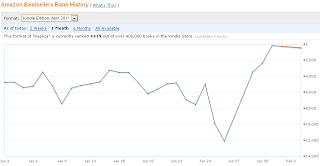 At the end of January, Kindle Direct Publishing sales reports broke. I'd sold 201 copies of Replica on the 31st January after my promotion; when I woke on the 1st I'd sold another 20. For the rest of the day, nothing. For the next day or two, sales limped in intermittently, like survivors of a lost battle.
At the end of January, Kindle Direct Publishing sales reports broke. I'd sold 201 copies of Replica on the 31st January after my promotion; when I woke on the 1st I'd sold another 20. For the rest of the day, nothing. For the next day or two, sales limped in intermittently, like survivors of a lost battle.Nobody who hasn't self-published via KDP on Amazon will appreciate the disruptive effects of any glitch in Amazon sales reporting. We all look at our stats far too often, hoping for that small jolt of pleasure we get when another sale ticks up. When things go wrong, the herd gets restive - see this mammoth thread on Kindleboards. Traditionally published authors know nothing of this; their frustrations come from being completely in the dark as to what their book's rank means in terms of numbers sold. They are reduced to asking indies about it, who are generally much more helpful than their publishers.
Should we worry that, if sales are not reported to us, they are lost in the system and will not be paid for? Almost certainly not. Terence O'Brien wrote this about Amazon's two independent systems, sales and reports:
We can look at the characteristics of the two systems. One is the ordering/billing/delivery (OBD) system. The other is the KDP reporting.
The OBD is vital to the life of the company. The time and effort devoted to that kind of system, the backups and redundancies included, and the attention from management reflect that importance.
KDP reporting isn't necessary for anything. Nothing depends on it. It's just a nice gesture from Amazon to some of its suppliers.
So the OBD system is far more robust and flexible. It can, and probably does, recognize impending problems every day, and route around them. There is no reason to devote the same level of resources to KDP reporting, not in building it or fixing it.
There's a similar difference between Amazon Customer Support, which is legendary and excellent, and KDP Support...which is not. Responses are slow, and staff often misunderstand your point, deny there is a problem, or repeatedly fail to fix an acknowledged problem. It's really quite bad.
Published on February 03, 2012 03:50
January 26, 2012
REPLICA free for two days
 I joined KDP Select when it started (I blogged about it here). One advantage was that books in the programme would be available for Amazon Prime members to borrow. In December, the payment for each loan was $1.70 - more than I get when I sell a book.
I joined KDP Select when it started (I blogged about it here). One advantage was that books in the programme would be available for Amazon Prime members to borrow. In December, the payment for each loan was $1.70 - more than I get when I sell a book.The other benefit was the ability to make a book free for up to five days each 90 day period. I didn't think I'd be taking advantage of this. When I first published, I made Remix free on Smashwords for a weekend, and gave away several hundred copies. This had no discernible effect on sales. With Amazon, though it is early days still, some authors (not all) have found a brief giveaway breathes new life into a book, bringing it to the attention of readers who would not otherwise have found it.
So today and tomorrow (midnight to midnight Pacific Standard time) you will be able to get an ecopy of Replica free. Do tell your friends.
N.B. Replica has a total of 79 reviews in the US and UK, 59five star and 13 four star.
Published on January 26, 2012 15:59



